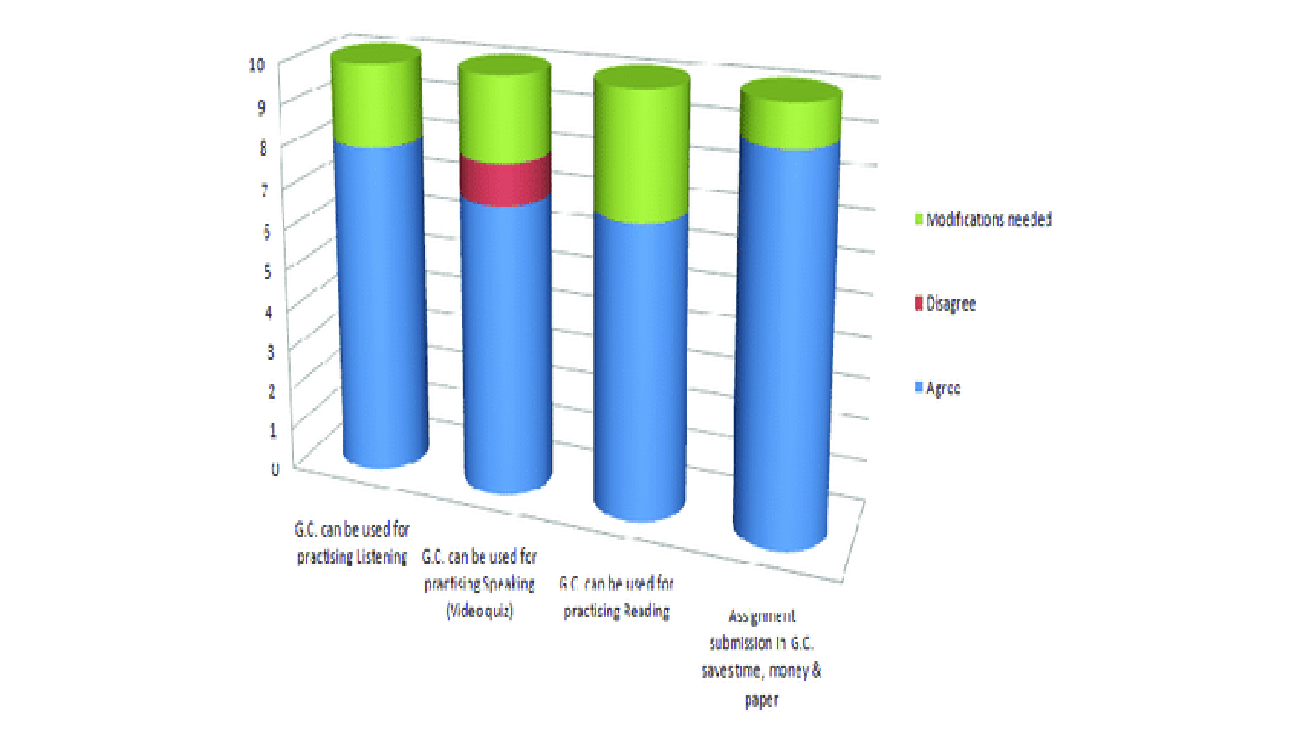
Techno-Aide Google Classroom for Learning English: Prospects & Challenges
Techno-Aide Google Classroom for Learning English: Prospects & Challenges Google Classroom is a technology aided online learning tool developed by Google which enables both the teachers and learners to fit into ‘beyond the classroom’ learning in an innovative way. This research paper tries to shed light on the prospects and challenges of using Google classroom for learning English at the tertiary level education in Bangladesh. For finding out the prospects and challenges, both English language learners’ and teachers’ perception on the ground of the four language skills- Listening, reading, Writing and Speaking have been studied. The research has been conducted following the quantitative method. An electronic survey was distributed among the students and teachers using Google Form for collecting and comparing responses. The prospect includes how Bangladeshi university students and teachers sense and experience this online tool to stay in touch, as well as develop and manage their work to learn English efficiently. Alongside the common challenges faced by the users (both learners and teachers) this research tries to trace out some technical shortcomings of Google classroom that can be eradicated by Google to turn Google classroom into more user-friendly platform for learning.
Author(s):
Keywords:
Google classroom, technology, learners, teachers, perception, English learning
URL:
https://jotitt.chitkara.edu.in/index.php/jotitt/article/view/135
References:
M. S. Islam, “Bangladeshi university students’ Perception on using google classroom for teaching english,” International Journal of Psycho-Educational Sciences, vol. 8, no. 2, pp. 57-65, 2019.
S. Patrick, and C. Sturgis, “Maximizing competency education and blended learning: Insights from experts,” 2015. [Online]. Available :https://files.eric.ed.gov/fulltext/ED557755.pdf [Accessed December 12, 2018]
S. Curtis, “How technology is changing childhood,” The Telegraph, pp. 6, 2013. [Online]. Available: https://www.telegraph.co.uk/technology/news/10529785/How-technology-is-changing-childhood.html [Accessed December 06, 2018]
M. Thomas, H. Reinders, and M. Warschauer, “Contemporary computer-assisted language learning: The role of digital media and incremental change,” In Contemporary computer-assisted language learning, London: Bloomsbury Publishing, 2012, pp. 21-31.
M. Warschauer, “Computer-assisted language learning: An introduction,”Multimedia Language Teaching, S. Fotos, Eds. Tokyo: Logos International, 1996, pp. 3-20.
Y.-J. An, and C. Reigeluth, “Creating technology-enhanced, learner-centered classrooms: K–12 teachers’ beliefs, perceptions, barriers, and support needs,” Journal of Digital Learning in Teacher Education, vol. 28, no. 2, pp. 54-62, 2011.
K. N. Nemeth, and F.S. Simon, “Using technology as a teaching tool for dual language learners in preschool through grade 3,” National Association for the Education of Young Children, vol. 68, no. 1, pp. 48-52, 2013.
R. Mahrooqi, and S. Troudi, “Using technology in foreign language teaching,” Cambridge: Scholars Publishing, 2014.
D. Bebell, and R. Kay, “One to one computing: A summary of the quantitative results of the Berkshire Wireless learning initiative,” The Journal of Technology, Learning, and Assessment, vol 9, no. 2, pp. 1-60, 2010.
S. Iftakhar, “Google classroom: What works and how?” Journal of Education and Social Sciences, vol. 3, pp. 12-18, 2016.
“Google Classroom,” 2016. [Online]. Available: https://blogs.umass.edu/onlinetools/community-centered-tools/google-classroom [Accessed November 20, 2018]
A. Keeler, “15 more things you can do with google classroom,” 2014. [Online]. Available: https://alicekeeler.com/2014/09/22/15-more-thingsyou-can-do-with-google-classroom/[Accessed December 21, 2018]

